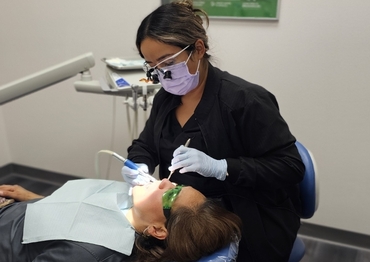
Deep cleanings, also known as scaling and root planing, are utilized when a patient develops gum disease over time due to bacterial toxins. Gum disease or periodontal disease is a potentially dangerous condition that threatens many Americans; some statistics indicate that over 70 percent of persons over the age of 40 have the disease. Symptoms include bleeding gums, calculus buildup underneath the gums, bad breath, and loose teeth. Not only is gum disease the number one cause of tooth loss, but it is also now a known contributor to heart disease and stroke risk.
Deep cleanings involve a thorough cleaning (scaling) that removes plaque and tartar buildup both above the gum line and below it, where bone loss has occurred (deep pockets). Exposed roots are smoothed (planed) to allow proper healing of the tissues. Antibiotics or irrigation with antimicrobials (mouth rinses) may be utilized to help control the growth of bacteria that create toxins and cause further and worsening stages of periodontal disease. When deep pockets between teeth and gums are present, it is difficult to maintain proper hygiene and keep these areas clean, so more frequent cleanings are recommended to manage the disease.
